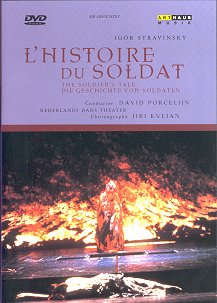Igor STRAVINSKY
(1882-1971)
L' Histoire du Soldat (The Soldier's Tale)
Choreography by Jiri
Kylian
Soldier…………………Nacho
Duato
Devil…………………..Aryeh Weiner
Alter Ego…………… Gerald
Tibbs
Mother……………… Teresina
Mosco
Fiancée……………… Fiona Lummis
Friend of the Soldier….Lionel
Hoche
Princess……………….Karin Heyninck
Tango danced by…… Sabine Kupferberg Glen Eddy
Waltz danced by…… France Nguyen Phillip Taylor
Ragtime danced by… Brigitte Martin James
Vincent
 Nederlands Dans
Theater
Nederlands Dans
Theater
Conductor: David
Porcelijn

 ARTHAUS DVD VIDEO 100 132 Subtitles (narration)
in English and German [51
mins]
ARTHAUS DVD VIDEO 100 132 Subtitles (narration)
in English and German [51
mins]
Crotchet
£18.99

At the outbreak of the First World War, Stravinsky emigrated from Russia
to Switzerland where he composed L'histoire du soldat in 1918. It is a work
that reveals the influence of jazz but also reflects the disillusionment
felt by many at that time - the story is full of allegorical meaning. Charles
Ferdinand Ramuz (1878-1947), the librettist of the work (the words are spoken
over the ballet by a narrator) was a Swiss writer and essayist who published
his works in French.
The Soldiers Tale is a drama that is a timeless creation with roots
in no particular place. In a series of scenes designed "to be read, played
and danced", and based on the street ballad tradition, the story is about
a soldier's pact with the devil. Returning home on leave, he is persuaded
by Satan to exchange his fiddle for a mysterious book. The devil promises
him a lift home on his shoulders and that, with some pleasant distractions
en route, he will be home in three days. But the soldier awakens to find
three years have passed and that his fiancée has married another.
From there on it is downhill all the way with him making and losing a fortune,
losing all his loved ones, but saving the life of a princess. Yet it is she
who ultimately seals his fate when he unwisely gives in to her insatiable
curiosity and takes her to see his homeland for he has been told that if
he crosses the borders of her land he will be forever damned.
Stravinsky's score is based on seven instrumentalists: clarinet, bassoon,
tenor and bass trombone, double bass, cornet, violin and snare drum. The
piece is centred on the violin which represents the soul of the soldier.
The eleven musical pieces that comprise the work begin with the leitmotif
of the soldier's march, the melody of which is passed from one instrument
to the next above a constant accompanying figure in the bass line. One of
the highlights of the ballet is the three dance miniatures by the Princess
consisting of a stylised Argentinian tango, an English waltz and an Afro-American
ragtime. The culminating devil's triumphal march with ghostly skeletal drum
rhythms sees the soldier's soul consigned to the pit as Satan appears, in
his true lurid red colours, to claim him.
The visual elements of this ballet are excellent. The sets are sparse but
clever. Stage flaps open to reveal children's book cut-outs of buildings
for instance, Costumes are equally convincing with the devil first appearing
in what looks like a clergyman's dog collar; the Fury's dressed in flowing
black diaphanous robes; and the Princess's dancers are dressed in carnival
clothes. The lighting and special effects are equally impressive. But the
main praise is for Jiri Kylian's imaginative and elegant choreography. The
story has its roots in early puppet theatre plays about the pact between
Mephisto and Faust, consequently much of the jerky, grotesque movements
particularly in the opening scene, attributed to the soldier, as he is making
his way home, suggest marionette manipulation. It is as if this is a foreboding
of the devil's own manipulations. Further on, when the devil appears in a
scarlet military tunic to shoot down a troop of soldiers (a very funny sardonic
episode) the soldiers are 'frozen' in attitudes suggesting the stances (on
their flat stands) of the tin soldiers we played with as children. Another
allegory of satanic manipulation. Kylian's dances are beautiful and intricate
and, more often smoothly flowing with some very impressive ensemble work
between duos, trios and more dancers. The leading dancers all shine.
One of the more impressive Arthaus DVD releases and recommended.
Ian Lace


